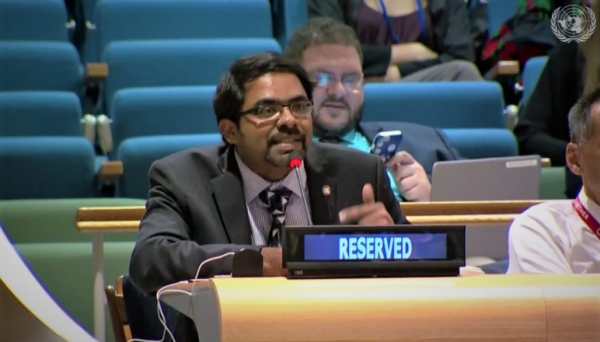“We need to science the shit out of tuberculosis,” Madhukar Pai, director of the McGill Global Health Programs, said in front of the United Nations (UN) at their headquarters in New York in September.
The meeting was a historic event; it was the first-ever high-level UN meeting organized to address the ongoing tuberculosis (TB) crisis. Pai’s statement to the General Assembly was an appeal for politicians to increase investment in research and development.
TB continues to be the leading infectious disease killer, claiming the lives of about 1.7 million people in 2016– approximately equal to the entire population of Montreal the same year. An estimated USD$1.3 billion per year supplement to the existing budget is required to fund newer drugs and discontinue the use of antiquated diagnostic tools. Current drugs used to treat MDR-TB, a drug-resistant form of the disease, are highly toxic with side-effects that include deafness. Given the necessary funding, the UN aims to eradicate the disease by 2030.
Although those fighting to eradicate TB pushed country leaders to be present at the meeting in New York and to support the initiative, attendance was underwhelming. None of the G7 heads of state, including Prime Minister Justin Trudeau, were present. The only key political invitee present was South African President Cyril Ramaphosa.
Pai described the turnout as disappointing.
“It is still very hard for TB to be a political priority,” Pai said in an interview with The McGill Tribune.
Between 2014 and 2016, Ebola caused an estimated 11,000 deaths while, in that same period, TB killed more than three million. Pai attributes the lack of concern among politicians to the fact that, unlike other epidemics in the past, TB continues to affect the poorest strata of the world’s population.
“People are quietly dying”, Pai said.“[Politicians] have become desensitized to it.”
In an op-ed for the Huffington Post, Pai stated that, if each country spent 0.1 per cent of its annual gross domestic expenditure on research and development (GERD) on TB, the UN could collectively meet its $1.3 billion USD per year budget. Pai believes that the ongoing TB crisis is a result of an unwillingness on the part of political leaders to allocate funds, rather than a difficult scientific problem to solve. His sentiments allude to the colonial roots of global health, which the numbers suggest are still an influence today.
“The fact that we have TB up north in our Inuit communities three hundred-fold higher than here tells you that this is not a science issue,” Pai said.
With regard to the future of tuberculosis research, Pai stressed that high-burden TB countries should lead the discourse going forward.
“[The] TB agenda is still being dictated by rich white people from countries with hardly any TB,” Pai said.
Currently, global health initiatives are mostly funded by the United States. According to Pai, this puts global health in a one-sided and precarious position.
“All of global health is under threat under the Trump administration,” Pai said.
Passing the baton to high-burden TB countries that have the money and tools to tackle the problem would be the next advisable step. Pai believes that China and India have the resources and money to take the lead. Furthermore, he thinks it is crucial to involve TB survivors in the conversation to foster a strong civil society movement that will hold politicians accountable for their progress on the issue.






